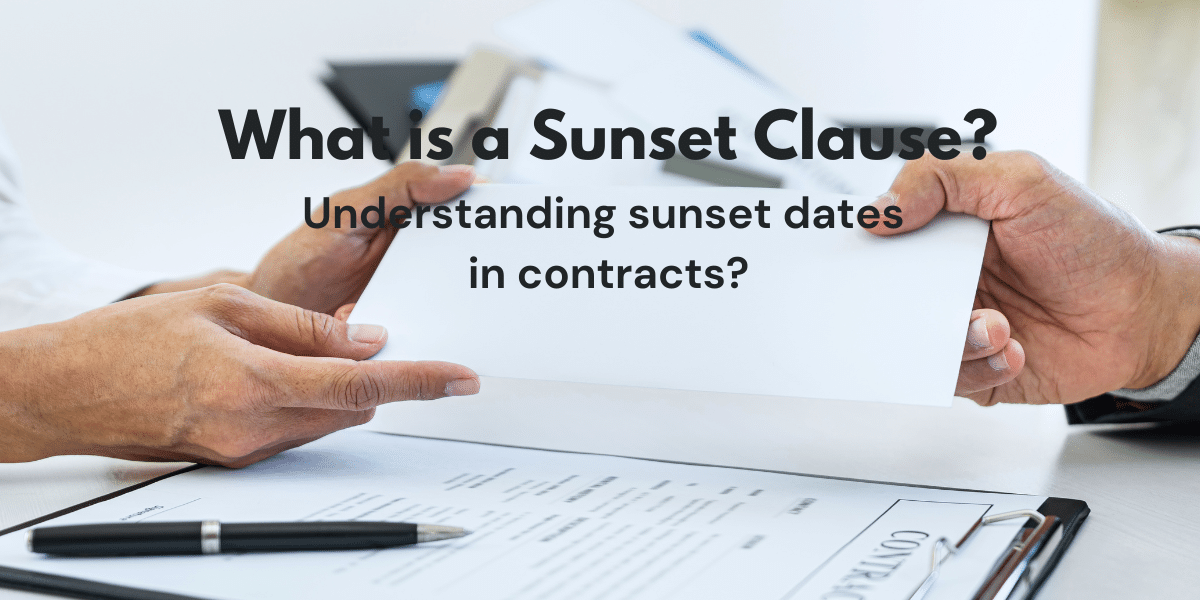When you enter into a contract, you might come across terms that sound a bit puzzling. One of those is the “sunset clause.” It’s not about watching the sun dip below the horizon. Instead, it’s about knowing when a contract or agreement will end and what happens before it does. Let’s break it down!
What Exactly is a Sunset Clause?
A sunset clause is a provision in a contract that sets a specific date or condition under which the contract will expire. Just like the setting sun, it marks a finite end to an agreement, providing both parties with clarity. This clause acts like a countdown timer, making sure everyone knows when to wrap things up.
Why Do We Have Sunset Clauses?
Ever wonder why sunset clauses are so popular? They offer a safety net. If the parties involved aren’t seeing the results they hoped for, a sunset clause allows them to step away without facing penalties. It’s like a “trial period” for a contract. If things aren’t working out, you can pack up and leave instead of being stuck in something that doesn’t benefit you.
How Do Sunset Dates Work?
Sunset dates can be included in many types of agreements, from real estate deals to business partnerships.
Examples of Sunset Clauses in Contracts
- Real Estate Sales: In real estate, a sunset clause might state that if a buyer doesn’t close the sale within six months, the contract will be void. This protects sellers from being tied up with buyers who might not be committed.
In the case of signing a contract to purchase land or an apartment off the plan, the contract will include a sunset clause that gives the developer a deadline from completion of construction, registration of indefeasible separate titles and settlement. - Partnership Agreements: Businesses can insert sunset clauses into partnership agreements where the partnership lasts for five years. At the five-year mark, partners can reassess whether to continue or part ways.
- Licensing Agreements: If a company licenses its technology, a sunset date could indicate when the license will end if certain milestones aren’t met. This gives time for adjustments and discussions.
The Benefits of a Sunset Clause
So, why add a sunset clause to your contract? It brings peace of mind. Here’s how:
- Flexibility: It allows both parties to reassess their priorities as time goes by. Things change, and contracts should reflect that.
- Clarity: It provides clear expectations. Everyone knows when the obligation ends, alleviating confusion.
- Protection: It protects against long-term commitments that may no longer serve a purpose. Think of it like a safety net that lets you pivot without too much hassle.
When Should You Consider a Sunset Clause?
Ask yourself: “Do I want the option to change direction down the road?” If yes, then incorporating a sunset clause might be a wise move. It helps avoid being locked into agreements longer than necessary, which can be a heavy weight to carry.
Conclusion
Sunset clauses can light the way for clear, flexible agreements in contracts. They shine a spotlight on end dates and conditions, making them invaluable for anyone entering into a contract. When the sun sets on a deal, it doesn’t have to be the end of the world. Instead, it can be a chance to reassess and decide what’s next. Embrace the sunset clause and make your contracts work for you!
If you are considering entering into any form of contract , we recommend have our team of experienced and friendly conveyancing lawyers review your contract to ensure the appropriate legislation and requirements for sunset clauses are included to protect you and minimise the risk of costly consequences for you and your family. Reach out to us today on 07 3088 6161!
Disclaimer. The legal content contained in this article has been provided for general interest only. It does not constitute legal advice.



